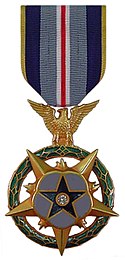| Congressional Space Medal of Honor | |
|---|---|
 | |
| Type | Medal |
| Awarded for | "exceptionally meritorious efforts and contributions to the welfare of the Nation and mankind" |
| Country | United States |
| Presented by | the United States Congress |
| Eligibility | NASA astronauts |
| Status | Active |
| Established | September 29, 1969 |
| First awarded | October 1, 1978 |
| Total | 28 |
| Total awarded posthumously | 17 |
Congressional Space Medal of Honor ribbon | |
| Precedence | |
| Next (higher) | (none) |
| Next (lower) | NASA Distinguished Service Medal NASA Distinguished Public Service Medal |

The Congressional Space Medal of Honor was authorized by the United States Congress in 1969 to recognize "any astronaut who in the performance of his or her duties has distinguished himself or herself by exceptionally meritorious efforts and contributions to the welfare of the Nation and mankind".[1] It's awarded by the President of the United States in Congress's name on recommendations from the Administrator of the National Aeronautics and Space Administration. The award is a separate decoration from the Medal of Honor, which is a military award for extreme bravery and gallantry in combat.
While the Congressional Space Medal of Honor is a civilian award of the United States government, it is authorized as a non-military decoration for display on U.S. military uniforms because it is awarded by a federal agency. In such cases, the Congressional Space Medal of Honor is worn as a ribbon "immediately preceding the Prisoner of War Medal".[2] DoD policy specifically prohibits wear of any non-military awards for valor or service, but the Congressional Space Medal of Honor only recognizes meritorious achievement, so it does not fall under this prohibition.[3]
To be awarded the Congressional Space Medal of Honor, an astronaut must perform feats of extraordinary accomplishment while participating in space flight under the authority of NASA. Typically, the Congressional Space Medal of Honor is awarded for scientific discoveries or actions of tremendous benefit to mankind. The decoration may also be awarded for extreme bravery during a space emergency or in preventing a major space disaster, or posthumously to those astronauts who die while performing a U.S. space mission. As of 2022[update], all 17 astronauts killed on US missions had been awarded the medal.
President George W. Bush awarded the most CSMOH with 16; 14 of them posthumous for crews of the two destroyed space shuttle flights, Challenger and Columbia. President Joe Biden awarded the CSMOH to Crew Dragon Demo-2 members Doug Hurley and Bob Behnken on January 31, 2023. The 16-year hiatus from April 2006 to January 2023 is the longest gap between awards.
- ^ Cite error: The named reference
nasa_listwas invoked but never defined (see the help page). - ^ DoDI 1348.33, Dec. 21, 2016, Change 5, Apr. 9, 2021, Sec. 11: https://www.esd.whs.mil/Portals/54/Documents/DD/issuances/dodi/134833p.pdf
- ^ DoDI 1348.33, Dec. 21, 2016, Change 5, Apr. 9, 2021, Sec. 11(a)